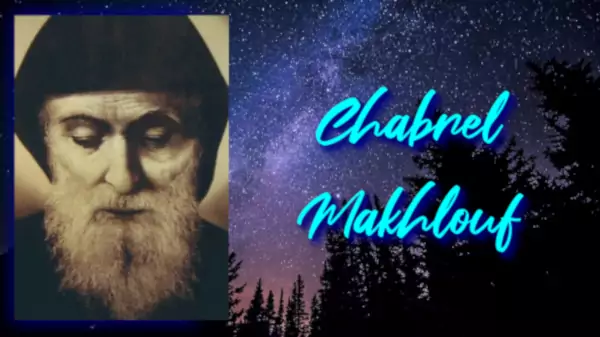July 24 - Charbel, born Youssef Antoun Makhlouf in Bekaa Kafra (North Lebanon) on May 8, 1828. Son of Antoun Zaarour Makhlouf and Birgita Chidiac, humble Maronite peasants (Eastern Catholic Christians), the young Youssef, receives a very pious education, which gives him from childhood a strong taste for prayer.
Following his two hermit uncles, who had retired to the monastery of Saint Anthony of Qozhaya, he aspired more and more to the eremitical life. In 1851, at the age of 23, responding to a supernatural call, he suddenly left the family home during the night, without warning anyone, without saying goodbye to his mother, left his village and walked to the monastery of Our Lady of Maïfouk. He spent his first monastic year at the monastery of Maïfouk. In 1852, his superiors sent him to the monastery of Saint Maron in Annaya (Mount Lebanon), where he entered the Lebanese Maronite Order under the name of Charbel. On November 1, 1853, he took his final vows in the same monastery. He completed his theological studies at the Monastery of Saints Kibrianos (Saint Cyprian)-et-Justine in Kfifan (Batroun region).
Brother Charbel was ordained priest in Bkerke, the seat of the Maronite patriarchs, on July 23rd 1859. He returned immediately afterwards to the monastery of St. Maron of Annaya, where he lived in prayer and voluntary confinement for 16 years. On February 15, 1875, aspiring to an ever more intense eremitical life, he joined, with the permission of his superiors, the small isolated hermitage of Saints Peter and Paul. The heart of his day was the celebration of the Eucharist, for which he prepared himself fervently every morning and which he lived intensely. He very rarely left his hermitage to come to the monastery, and did so in obedience to his superiors. His whole life and his whole person were as if immersed in God. He lived a perfect hermit life for 23 years.
On December 16, 1898, while he was reciting the liturgical prayer "Father of Truth"" during his morning mass, assisted by an acolyte, Father Charbel was paralyzed. Bedridden in his hermitage, he enters a serene and silent agony that would last eight days, during which he never stops repeating this unique liturgical prayer word, in a voice barely audible: "Father of Truth, here is your Son...". On December 24th, 1898, at 5 p.m., during the Christmas Vigil, he gave his soul back to God. In the hours following his death, the monks watching him noticed that a blood exudation oozed from the surface of his body. After the funeral, which takes place on Christmas Day, he is buried without a coffin, in the ground, according to the tradition of the monastic order to which he belongs. On the night of December 25 to 26, a few hours after his burial, inexplicable signs appeared around his grave, and peasants, seeing the light from afar, came to the monastery to ask about it. Sick people were soon brought there to ask the deceased for graces of intercession. At the end of a beatification process that lasted almost forty years, the Servant of God Charbel was beatified on December 5, 1965 by Pope Paul VI in St. Peter's Basilica in Rome. At the end of a new process of canonization that lasted twelve years, Blessed Charbel was solemnly canonized on October 9, 1977 by Pope Paul VI.








